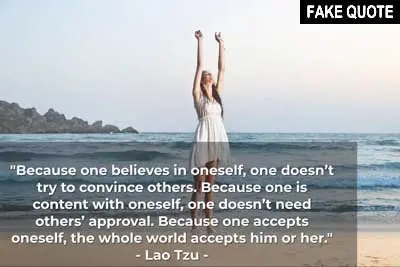Fake Lao Tzu Quote
"Because one believes in oneself..."

This is NOT a quote from Tao Te Ching:
"Because one believes in oneself, one doesn't try to convince others. Because one is content with oneself, one doesn't need others' approval. Because one accepts oneself, the whole world accepts him or her."
The Book
The Taoism of Lao Tzu Explained. The great Taoist philosophy classic by Lao Tzu translated, and each of the 81 chapters extensively commented. Click the image to see the book at Amazon (paid link).
More about the book here.
|
The perspective of these lines is self-oriented. It's all about how splendid it is to be pleased with oneself. That is definitely not something Lao Tzu would say or applaud. To him, it was not at all about praising oneself — quite the opposite.
His ideal was modesty and humility. For example, in chapter 2 he stated that the sage never demands honor for his deed, adding (my version):
Because he demands no honor,
He will never be dishonored.
And in chapter 7:
The sage puts himself last and becomes the first,
Neglects himself and is preserved.
Is it not because he is unselfish that he fulfills himself?
Again about the sage, in chapter 22:
He does not show off, therefore he shines.
He does not justify himself, therefore he is revered.
He does not boast, therefore he is honored.
He does not praise himself, therefore he remains.
Chapter 63 explains that because the sage does not strive for greatness, he can accomplish it, and chapter 77 says that the sage acts without taking credit, accomplishing without dwelling on it.
|
90 of the most spread false Lao Tzu quotes, why they are false and where they are really from. Book by Stefan Stenudd. Click the image to see the book at Amazon (paid link).
More about the book here.
|
The oldest book I have found with the complete quote examined here is Comfortable in Your Own Skin from as late as 2014, by Leandie du Randt. The following year there were three books published with the quote. They all ascribed it to Lao Tzu.
The quote appeared several years earlier on the Internet. The oldest occurrence would be on the Goodreads website, where the quote, accredited to Lao Tzu, got its first like on December 19, 2009. On Facebook, the first appearance was in May 2011, also naming Lao Tzu as the author.
So, it is safe to say that the quote in this wording had its origin on the web.
There is a text with similar wording and content to be found on the Internet, but not in any book:
When you believe in yourself, you don't try to convince others. Because you are content with yourself, you don't need others' approval. When you accept yourself, the whole world accepts you also.
It is not ascribed to Lao Tzu — or to anyone else, as far as I have found. But the similarities with the quote examined here are striking. It is not unlikely that they have the same source, which then has been paraphrased in different directions. I don't know what that source is, but it is not Lao Tzu.
Stefan Stenudd
September 13, 2020.
There are many more fake Lao Tzu quotes examined on this website.
Click the header to see a list of them.
Click the header to read a "fake" interview with Stefan Stenudd, the author of
Fake Lao Tzu Quotes.
My Taoism Books
Click the image to see the book at Amazon (paid link).
The Taoism of Lao Tzu Explained. The great Taoist philosophy classic by Lao Tzu translated, and each of the 81 chapters extensively commented.
More about the book here.
The Ancient Wisdom of the Tao Te Ching by Lao Tzu. 389 quotes from the foremost Taoist classic, divided into 51 prominent topics. Click the image to see the book at Amazon (paid link).
More about the book here.
Erroneous Tao Te Ching Citations Examined. 90 of the most spread false Lao Tzu quotes, why they are false and where they are really from. Click the image to see the book at Amazon (paid link).
More about the book here.
|
My Other Websites:
The 64 hexagrams of the Chinese classic
I Ching and what they mean in divination. Try it online for free.
The ancient Chinese life energy
qi (
chi) explained, with simple instructions on how to exercise it.
The many ancient and modern life force beliefs all over the world explained and compared.
Other Books by Stefan Stenudd
Click the image to see the book at Amazon (paid link).
The Greek philosophers and what they thought about cosmology, myth, and the gods.
The life energy
qi (also
chi or
ki) explained, with exercises on how to awaken, increase and use it.
Basic concepts of the peaceful martial art. Aikido principles, philosophy, and fundamental ideas.
Qi, prana, spirit, ruach, pneuma, and many other life forces around the world explained and compared.
Jungian theories on myth and religion examined, from Carl G. Jung to Jordan B. Peterson.
About me
I'm a Swedish author and aikido instructor. In addition to fiction, I've written books about Taoism and other East Asian traditions. I'm also an historian of ideas, researching ancient thought and mythology. Click the image to get to my personal website.

 Tao Te Ching
Tao Te Ching Now it's a book, too!
Now it's a book, too! Tao Quotes
Tao Quotes Cosmos of the Ancients
Cosmos of the Ancients Qi — Increase Your Life Energy
Qi — Increase Your Life Energy Aikido Principles
Aikido Principles Life Energy Encyclopedia
Life Energy Encyclopedia Archetypes of Mythology
Archetypes of Mythology Stefan Stenudd
Stefan Stenudd